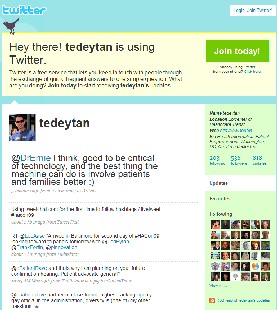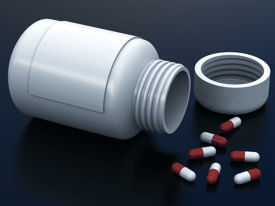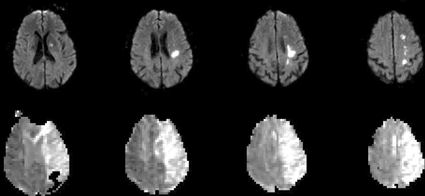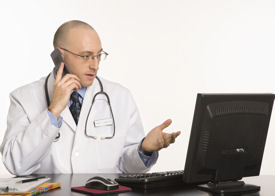Twitter: a medical help, hindrance or hype?
Imagine a future where you can with a click of the mouse see what your patients and colleagues read on the Internet this morning, what they ate for lunch, and what they're working on right now. Whether that sounds to you like a potential practice innovation or a disaster of oversharing probably indicates whether you'll have any use for Twitter, the most hyped Internet innovation of the year.
Imagine a future where you can with a click of the mouse see what your patients and colleagues read on the Internet this morning, what they ate for lunch, and what they're working on right now.
Whether that sounds to you like a potential practice innovation or a disaster of oversharing probably indicates whether you'll have any use for Twitter, the most hyped Internet innovation of the year. Twitter is a Web site that allows users to instantly communicate messages of up to 140 characters to their online audiences.

A user's audience consists of anyone who has signed up to receive his or her tweets (as the short messages are known), and can range from a couple of friends to thousands for a celebrity Twitter feed. (For example, CNN doc Sanjay Gupta had 2,450 followers at last count.)
Learning by twittering
Medical twittering recently made headlines on CNN and other news outlets when surgeons at Henry Ford Health System twittered a robotically assisted laparoscopic partial nephrectomy. As surgeons did the cutting, a resident in the room posted updates like “we have dissected down to the deepest portion of tumor and appear to be successfully excising the tumor” and “the tumor appears to be too large to fit in the endocatch bag, we may need to get a larger bag.” (See the Henry Ford Twitter feed here. )
What's the effect of making this OR chat public? Although he was involved in one of the twittered procedures, surgeon James Peabody, MD, hasn't decided about the new technology yet. “I'm not sure how great an instructive tool it is. For medical students or other surgeons who are trying to learn the procedure, actually seeing the steps would actually be more informative,” he said.
But, he continued, twittering didn't cause any apparent harm and it did attract attention. “It was at the request of the media services people. They wanted to see if this was something that would be useful. We talked to the patient and told them it wouldn't really interfere with the surgery.”
Surgeons aren't the only ones jumping on the Twitter trend. Perhaps not surprisingly, some internists who are also prominent bloggers have gotten most heavily into twittering. In fact, expanding the reach of his blog is the main use that Kevin Y. Pho, ACP Member, (aka KevinMD ) has found for Twitter.
“I primarily use it as a way to connect with readers. If my readers have any feedback or questions, they can ask me and I can respond quickly,” Dr. Pho said.
Virtual curbside consults
A lot of Twitter communication occurs among bloggers, noted Robert J. Lamberts, ACP Member, of Musings of a Distractable Mind. “For me it's pure social,” he said. “You can gripe about your day.” In that griping, however, some medicine can happen, too.
“If it's social between two medical people, then the medical stuff comes into the social,” he said. For example, Dr. Lamberts has used his Twitter feed for a sort of curbside consult. “I'd say, ‘I just saw a little kid who's taking gentamicin nasal spray to get rid of ear infections. Have you ever heard of that?’” He soon had a number of responses—including one from an ENT—directing him to articles on just that topic.
But does that kind of utility mean that practicing docs will find real value in Twitter? Dr. Peabody leaned toward no. “If you had a particularly difficult case and you wanted to get some expert opinion on it, you could convene to get some thoughts about it, but even that doesn't seem like it would probably be the most efficient way to do it. It would be quicker just to call somebody on the phone if you wanted another opinion,” he said.
Dr. Lamberts noted that in a pre-twitter universe, instead of asking his followers about the nasal spray, he would have consulted with his partner or gone without a second opinion.
Now that Twitter has entered the world, however, all kinds of good could come of it, according to Ted Eytan, MD, a family physician who studies patient-centered health care and technology. “It's only been around two years. It's still really young. I personally don't know what the true medical applications are going to be right now,” he said.
One blogger, a nurse named Phil Baumann, sees a huge number of potential health care applications for Twitter. He wrote a blog post titled “140 Health Care Uses for Twitter, “ with ideas ranging from the case management to hospital fundraising.
Connecting with patients
Dr. Eytan didn't have quite that many suggestions for medical twittering, but he did predict that in the future physicians could use the feeds to communicate the results of important studies to their patients. Already, he uses Twitter to keep up on his colleagues' work in patient-centered care and health IT.
Eventually, Dr. Eytan envisions, physicians could use patients' Twitter feeds to better understand their lives outside the doctor's office. By reviewing a couple weeks' worth of a patient's tweets, a doctor could assess whether the patient has been depressed, has been getting enough exercise or eating healthily.
Of course, the potential utility of such data would have to be balanced against one of the main criticisms of Twitter—information overload. “There are people who are going to be twittering what they're eating for lunch—things that may not be of interest to other people,” said Dr. Pho.
They may disagree about the intrinsic interest of other people's lunches, but all of the experts agreed that Twitter is likely to be around and growing for a while. “It's better for physicians to get comfortable with this technology. I think they should take a minute to check it out because their patients are using it,” said Dr. Eytan.
And if nothing else, Twitter gives you a chance to practice your skills at writing brief, interesting messages, whether informative or humorous. “I am trying to perfect my one-liners,” said Dr. Lamberts.





